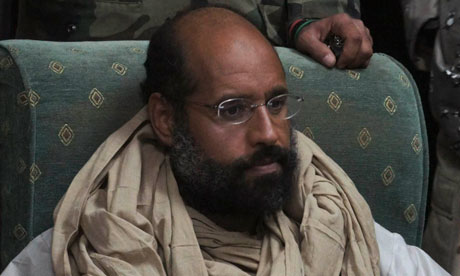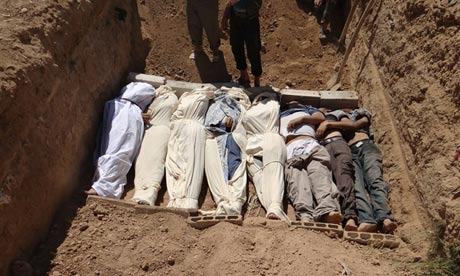New leaders, new policies and new alliances for the recently reunited group
Returning to civil-war-stricken Syria from thirty years of exile, the Muslim Brotherhood is facing challenges on multiple fronts in its attempts to re-establish itself. But the establishment of its own charities, civil institutions and armed wings are helping the Brothers make their presence felt.

This Tuesday, March 5, 2013 citizen journalism file photo provided by Aleppo Media Center AMC shows Syrian man sitting on a fallen statue of former Syrian President Hafez Al-Assad in a central square in Raqqa, Syria. Hafez Al-Assad ordered the massacre of up to 30,000 citizens by the armed forces, in the face of an uprising by the Muslim Brotherhood. (AP Photo/Aleppo Media Center AMC, File)
While the Egyptian Brotherhood makes global headlines and Tunisia’s Ennahda Party struggles to remain in power, very little is publicly known about the state of Syria’s Muslim Brotherhood. In recent weeks, much has been made of the decrease in the group’s influence over the Syrian National Coalition (SNC). In contrast, not a lot has been said on the Brotherhood’s actual influence inside Syria and its strategy for the revolution. How exactly does the movement plan on dealing with recent trends in the conflict, such as the rise of Islamic extremism in opposition ranks?
A series of interviews conducted with prominent Syrian Brotherhood members and other members of the opposition in Istanbul and Beirut reveal that the group is adapting to an increasingly fragmented Syria made up of competing centers of power. But even if it seems to be gaining some traction on the ground through humanitarian assistance, political activism and armed opposition, the Syrian Brotherhood is still facing enormous external and internal challenges.
The Brotherhood makes itself at home
“We’ll have to deal with two major problems in the coming months and years,” one member of the Syrian Brotherhood leadership remarked bluntly. “The first is to continue to rebuild our structure and, perhaps most importantly, our image [which has been] tainted by 30 years of absence.”
In Syria, membership in the Muslim Brotherhood has been punishable by death since a law was passed to that effect in July 1980. In February 1982, a large-scale regime massacre in the city of Hama led most remaining members to flee to neighbouring countries, where they are today estimated to number around 7,000–10,000. “The second problem,” argued the Brotherhood leader, “will be to deal with our own internal challenges.” The thirty-year exile of Brotherhood members has indeed stirred up tension within the group along regional and generational lines. An election to select the next leader is due next year, and it could be a turning point in the group’s future.
It was this simmering tension that led the Brotherhood leadership to agree, early on in the uprisings, on a “decentralization” policy: every regional sub-group forming the core of the Brotherhood would have to decide on the best strategy to return to Syria, rebuild a local following, and contribute to the revolutionary effort.
“Each ‘province’ of the group started working on its own on funding and, to an extent, on organizing, too,” explained a young Syrian Brother close to the leadership. This decentralization initially had a positive effect, as it attracted funding from many Syrian businessmen living in the Gulf who are more aligned with regional sub-groups, such as those in Aleppo or Hama, than with the whole Brotherhood leadership. However, because some cities—including Raqqa, Latakia, Dera’a and Deir Ezzor—have fewer members, and therefore less funding, most of the Brotherhood’s reconstruction and relief efforts have thus far focused on some cities more than others. “It’s painful for some of us,” complained a Muslim Brother from the east of Syria, “as it ultimately means that the bulk of the group’s funding for charity projects is now centered on Aleppo and Idlib, to the detriment of the rest of the country.”
In these two cities, the Brotherhood has opened offices for Ataa Relief, its charity wing. For the first time in thirty years, the group is also engaging in political activism on the ground by participating in the provincial and city councils that run the daily affairs in the “liberated” areas of Idlib and Aleppo. But it is its military presence that is increasingly being felt.
The rise of Brotherhood militias?
The Syrian Brotherhood officially endorsed the Free Syrian Army (FSA) and the armed struggle to topple Bashar Al-Assad rather belatedly, in March 2012. But evidence suggests that at least some within the movement began to court armed groups as early as late 2011, when the regime’s response to the uprising turned more violent.
Some of these Brotherhood figures supported the work of former member Haitham Rahmeh, who started providing funding and material assistance to rebel fighters in his native city of Homs, then under an intense military siege, in the summer of 2011. His umbrella group, called the Civilian Protection Commission (CPC), was set up with the help of Nazir Al-Hakim, a prominent activist with close ties to the Brotherhood in Aleppo.
As the military struggle became more widespread through 2012, the whole leadership then agreed to send some funding to carefully selected rebel groups that share its moderate Islamist ideology, such as the Omar Al-Farouk Brigade in Homs and the Liwa Al-Tawhid in Aleppo. “These two groups accepted our money and support at first,” acknowledged one Syrian Brother close to the leadership. But as wealthy donors started more actively supporting rebel groups in Syria, sources of funding diversified and these battalions gained autonomy. “Even though they now make their decisions independently from us, we still enjoy good relations with both of them,” the Brother added.
Rumours started spreading that the Brotherhood had grown frustrated with the situation and had formed its own militias.As time went on, and as looting, revenge and regime penetration all became more common in certain FSA battalions, rumours started spreading that the Brotherhood had grown frustrated with the situation and had formed its own militias. This followed an ambiguous statement made on the subject in the summer of 2012 by Moulhem Al-Droubi, a prominent Muslim Brother from Homs, before he was rebuked by the leadership, who immediately denied the creation of any Brotherhood-specific rebel groups. Finally, in January 2013, Riyadh Shuqfah, the group’s leader, gave an interview in which he acknowledged that “some battalions of an Islamic orientation formed and contacted us to coordinate.” These “centrist-minded” groups that “trust the Brotherhood” were finally invited to a conference in Istanbul, where they gathered under the Shields of the Revolution (Doroo Al-Thawwra). The Shields now comprise dozens of groups essentially based in Idlib and Hama and nominally placed under the authority of the Free Syrian Army and the Supreme Military Command.
But recent debates taking place within the Syrian Muslim Brotherhood suggest that the Shields could soon be placed more directly, and more formally, under the authority of the Brotherhood leadership. A proposal is being discussed that would select the most efficient and loyal of these groups, give them extra funding, train them in da’wa (“propagation,” or spreading the message of Islam), and nominate them as Muslim Brothers. This is a deeply contentious issue in a group keenly aware that one of its main challenges is to rebuild its image, which was tainted by its involvement in the armed struggle of the early 1980s that fuelled a confrontational dynamic with the Ba’ath party and culminated in a series of regime massacres like the one in Hama in February 1982.
Some oppose the move, fearing it will alienate some Syrians and contribute to further fragmentation of the opposition. “A more direct relationship between the Shields and the Brotherhood would effectively mean the emergence of a ‘military branch’ for the group, and this would be seen as wholly unacceptable to many inside and outside of Syria,” argued one Syrian Brother. “We would be seen as attempting to rule parts of the country.” But many others contend that dealing with the deterioration of the security situation on the ground, especially in rebel-held areas, matters more than any preoccupation with image and PR.
“What we need in a situation of chaos on the ground is the loyalty of some armed groups whom we trust and whom we know will follow our orders even in the most unpredictable of situations,” argued another member of the Brotherhood’s leadership, hinting at the possibility of sectarian massacres and the spread of chemical weapons. “It’s a risk worth taking,” agreed one Brotherhood sympathizer.
Looming confrontation with the Islamic extremists
At the heart of recent talks about formalizing the existence of rebel groups loyal to the Brotherhood is concern about the rise in the activities of Islamic extremists in rebel-held areas. These have heightened over the past few months as Salafist jihadist groups have seized swathes of the country’s eastern provinces, as well as the city of Raqqa. “The Al-Nusra Front’s second target after toppling the regime is to get rid of people belonging to our organization and, more broadly, to our school of thought,” suggested a Syrian Brother. He added, with a thinly veiled smile: “They think we’re not Islamic enough!”
Preparations are underway for a major confrontation with the Salafist jihadists of the Al-Nusra Front and the Islamic State of Iraq and Syria. “Our strategy to deal with them is twofold,” explained a leader of the Brotherhood. “On the one hand, we encourage dialogue to resolve issues but, except in the case of Ahrar Al-Sham, this has not been very successful so far. On the other hand, we want to start preparing to defend ourselves.” However, the looming confrontation will not happen just yet, for two reasons.
The first is pragmatic. Many Syrian Brothers seem to think that recent splits within the Al-Nusra Front suggest that the group is not as cohesive as it first seemed. They often tell stories of people they themselves know who are not jihadists but who left mainstream FSA brigades because of looting and corruption and joined the Al-Nusra Front instead, but are now frustrated with the group’s extremism. These are people who might eventually be lured into more centrist, Brotherhood-supported groups.
The second, and perhaps more important, reason is that the Brotherhood does not wish to start fighting the well-equipped extremists too early. “We’re not in a state to fight them and win right now,” explained one member of the Brotherhood. “Don’t bring the struggle to yourself quite yet,” warned another Syrian Brother. However, the recent assassination of a prominent FSA leader at the hands of extremists in the province of Latakia could mean that Brotherhood-affiliated brigades will confront the jihadists earlier than originally intended.
The battle between the Brotherhood (or groups of a similar school of thought) and Salafist jihadists will also be political and ideological. The Brotherhood, fairly influential in the provincial and local civilian councils of Aleppo and Idlib, will have to show that playing by the rules of democracy can be more rewarding both socio-economically and politically than living under the authoritarian rule of radical Islamists, like that in Raqqa. For this to be successful, the Brotherhood and its affiliates are betting on an ambitious communications agenda. In early February, the group launched a bi-monthly newspaper called Al-Ahd (The Covenant), with plans to turn it into a weekly in the near future. Its distribution throughout rebel-held areas, currently 10,000 copies per issue, is also set to increase. The coming weeks should also witness the emergence of a radio station called Masar FM, which will essentially broadcast news between the Aleppo–Idlib axis. Finally, the group plans to announce the formation of a new political party called the National Party for Justice and the Constitution (NPJC), nicknamed Waa’d (Promise). Its goal is to publicize the Brotherhood’s self-described “centrist” message and the group’s comeback on the Syrian political scene. The party will be made up of equal proportions of Muslim Brothers, independent Islamists and national figures. Two of these, Raymond Majoon and Nabil Kassis, are Syrian Christians who are part of the platform’s eleven-member leadership headed by Muhammed Walid, a Syrian Brother deemed to be a moderate Islamist by many.
The Brotherhood’s next leader
But the choice of Muhammed Walid as head of the NPJC is also a signal the Brotherhood’s leadership is sending to its own troops. He is a well-respected and rather consensual figure from Latakia, and he was not personally involved in the frictions between the Brotherhood’s Hama and Aleppo factions that have defined the group’s modern history. This suggests that the leadership’s priority is to remain united in the face of the Syrian crisis. This will be a difficult task for Walid, as internal tensions have been simmering for decades within the Syrian Brotherhood.
These tensions result mainly from an ideological squabble over the use of force that emerged in the early 1980s, which progressively turned regional and today are almost purely clannish. After the Hama massacre of 1982, most remaining members of the Brotherhood from the city sought refuge in Iraq, where they vowed to take revenge for the regime’s atrocities. Members from Aleppo managed to flee to other places such as Jordan, and to a lesser extent Turkey, from where they called for negotiations with the regime in order to allow the safe return to Syria of thousands of Muslim Brothers. Tensions between the two factions reached their peak when the result of internal elections held in 1985 to decide who should be the group’s next leader were contested. With the growing divide exacerbated by the geographical distance between the two groups, they split. Even though they later reconciled, frictions still exist to this day.
“The long rivalry between Hama and Aleppo resulted in the exclusivity of the leadership between the two of them,” complained a young Syrian Brother. Other regional blocs within the group joined this internal struggle by siding either with one or the other. For instance, it is often said most Syrian Brothers from Idlib, Dera’a, Deir Ezzor and Latakia are allied with the Hama faction. It was this powerful coalition that prevented the Aleppo faction, long used to ruling the organization, from retaining power within the leadership after its candidate, Adel Fares, lost the 2010 internal election. Riyadh Shuqfah from Hama was then elected as the Syrian Brotherhood’s new leader. In a sign of protest, former leader Ali Bayanouni and former ideologue Zouheir Salem, both from the Aleppo faction, temporarily resigned. But the start of the Arab Spring in Syria forced all members to unite again to tackle issues together. The leadership was restructured in March 2012 so as to allow a collective leadership to make the most important decisions consensually.
Several issues remain. First, tension is still simmering between the Aleppo and Hama factions, as suggested by the recent resignation of Zouheir Salem, who was a spokesman for the group. A few months back, Ali Bayanouni had himself resigned from his post as head of the political bureau, even though he remained part of the leadership. Muhammed Walid, the head of the NPJC, will now have the difficult task of holding the group together.
Second, there is a general sense of dissatisfaction with Riyadh Shuqfah, the group’s leader, who is not seen as assertive enough. “He is one of the reasons why the Brotherhood hasn’t been able to punch its weight in opposition politics,” explained a Brother close to the leadership. There was even an attempt by the Shura Council, the Brotherhood’s main legislative body, to unseat him, but the lack of a clear alternative prevented the leaders from following through. The Brotherhood’s deputy leader, Farouk Tayfour, a man seen as more influential than Riyadh Shuqfah himself, could have been a natural candidate if it had not been for his controversial history within the group.
Third, regardless of who is elected as the Brotherhood’s leader at next year’s internal election, the new head will have to take quick and far-reaching steps toward making the leadership more accessible to younger figures. The group is currently led by people who were already in charge thirty years ago; it is therefore imperative for the group to complete a generational handover if it wishes to be taken seriously when it comes to connecting with young conservatives in Syria. Rejuvenating the leadership would also reassure many dissidents inside and outside of Syria who are wary of any move by Brotherhood leaders to revive their ‘military branch,’ whose involvement in the events of the 1980s is still largely controversial.
The Brotherhood’s internal elections may only take place in a year’s time; but speculation over the results has already begun. The outcome may decide the longevity of the group’s presence on the ground in Syria.

Raphaël Lefèvre is a Gates Scholar and PhD candidate at the University of Cambridge. He is currently a Visiting Fellow at the Carnegie Middle East Center. He is also the author of Ashes of Hama: The Muslim Brotherhood in Syria (Hurst, 2013).
This article was originally published in The Majalla
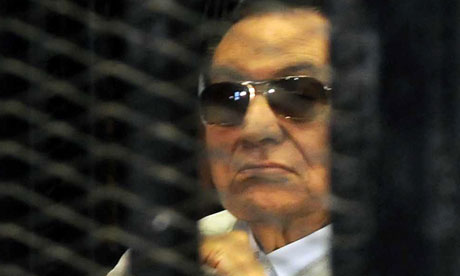



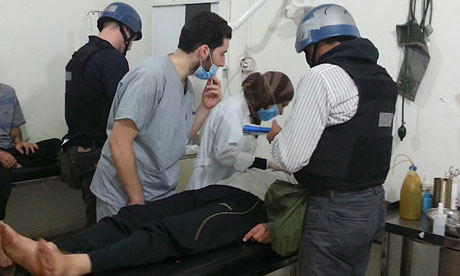
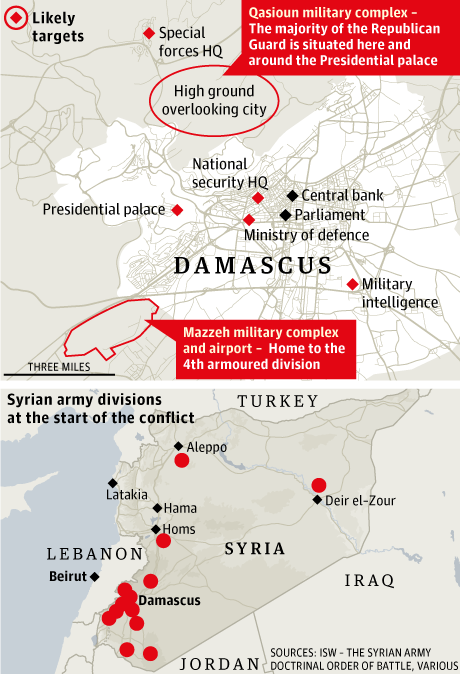 Likely targets in Syria
Likely targets in Syria 